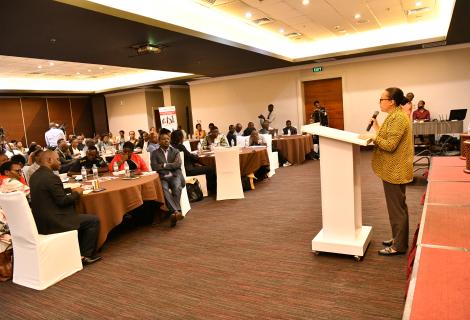AAR organized a national policy dialogue on Unpaid Care Work On 27th September 2022, ActionAid

On 27th September 2022, ActionAid Rwanda organized a National Policy Dialogue on Unpaid Care Work & its impact on Women’s Economic Empowerment at Park Inn Hotel in Kigali. The rationale behind that event was that even though the Government of Rwanda has developed great gender-responsive policies and strategies to support women’s empowerment and advancement of gender equality, there still exists gender inequalities ingrained in Rwandan context and culture that feminizes unpaid care work. As matter of fact on average, women spend approximately 26.7 hours per week on unpaid care work compared to only 16.1 hours spent by men
On 27th September 2022, ActionAid Rwanda organized a National Policy Dialogue on Unpaid Care Work & its impact on Women’s Economic Empowerment at Park Inn Hotel in Kigali.
The rationale behind that event was that even though the Government of Rwanda has developed great gender-responsive policies and strategies to support women’s empowerment and advancement of gender equality, there still exists gender inequalities ingrained in Rwandan context and culture that feminizes unpaid care work. As matter of fact on average, women spend approximately 26.7 hours per week on unpaid care work compared to only 16.1 hours spent by men.
In rural areas, women spend 6 hours against 2 hours for men while in the urbans women spend 2 hours against 1 hour for men. ActionAid Rwanda in partnership with UN Women organized the National Dialogue with policymakers and other stakeholders to share experiences and discuss on existing policy support and needed improvements for increased Recognition, Reduction, and Redistribution of UCW to accelerate Women Economic Empowerment.
In his welcome remarks, ActionAid Rwanda Convener stated that the “Unpaid Care Work affects mostly women and becomes more challenging in rural areas where they have limited financial capacity to access, and use needed facilities or to pay for care services.
One the recommendations of the research conducted about UCW in Rwanda emphasized that investing in time & labour-saving technologies in care and domestic work is key to reduce and redistribute the burden of unpaid care work especially for the most vulnerable women in rural areas.
Mr. Silas NGAYABOSHYA, Director General for Gender Promotion and Women Empowerment in the Ministry of Gender and Family Promotion commended ActionAid and UN Women support of awareness raising and advocacy efforts towards increased support for gender-responsive public services which recognize, reduce, and redistribute the care workload across all sectors at all levels hence accelerate the desired WEE in Rwanda. He pledged a continued Ministry support to address effects of unpaid care work on women economic empowerment through addressing negative social norms and gender stereotypes